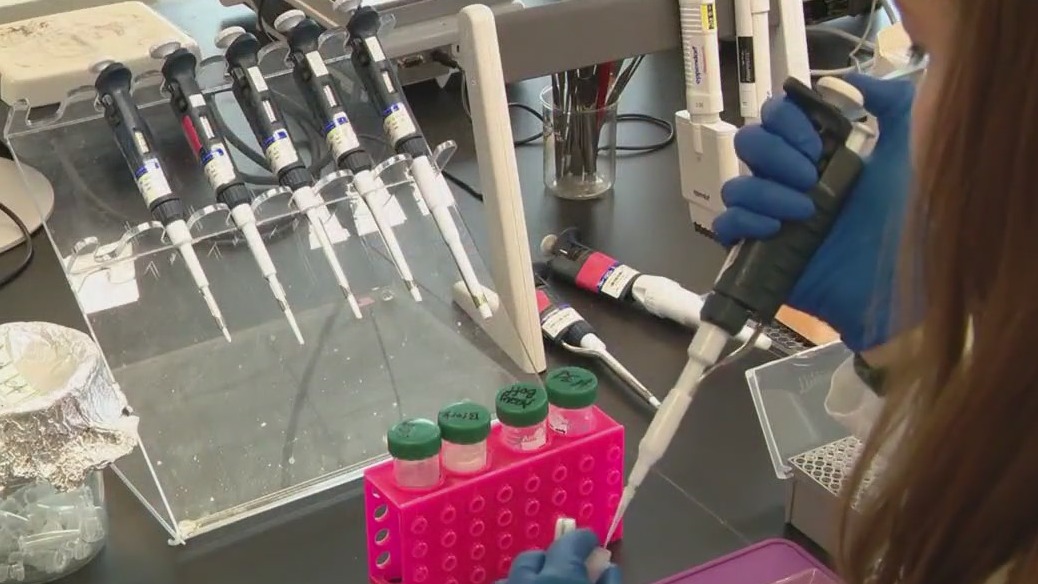Medical researchers work to create fentanyl vaccine to fight nation's opioid epidemic

Researchers working on fentanyl vaccine as drug overdoses spike
From chickenpox to Covid-19, there’s a vaccine for that. But have you ever heard of one that could help fight the nation’s opioid epidemic? In a Fox 32 special report, Elizabeth Matthews finds out more about a possible fentanyl vaccine.
CHICAGO - From chickenpox to Covid-19, there’s a vaccine for that. But have you ever heard of one that could help fight the nation’s opioid epidemic?
In a Fox 32 special report, Elizabeth Matthews finds out more about a possible fentanyl vaccine.
So far, the Cook County medical examiner’s office has logged nearly 2,000 opioid overdose deaths for 2022, many of them occurring because a deadly dose of fentanyl was mixed in.
"We need a different strategy to address this," said Dr. Colin Haile, a research associate professor at the University of Houston.
Medical researchers at the University of Houston are working on a way to stem the tide of the nation’s opioid epidemic, one that would to stop fentanyl in its tracks.
SUBSCRIBE TO FOX 32 CHICAGO ON YOUTUBE
"Some have called it a game-changer, and we do think it is a game-changer," Haile said.
For the last six years, Haile and his team have been working on what they call a "fentanyl vaccine." It includes proteins from two other inoculations already on the market.
"Our vaccine produces antibodies against a chemical, and that chemical is fentanyl," Haile said. "So in a vaccinated individual, if they consume fentanyl, those antibodies will bind to the drug and prevent it from getting into the brain."
The National Institute on Drug Abuse (NIDA) is consulting with Haile and his team on the project, and says it could help addicts stop using because it stops them from feeling high.
"Because it's a large molecule, it actually cannot cross between our circulation into the brain tissue itself. And so you, you're essentially sequestering fentanyl in the circulation," said Dr. Wilson Compton, NIDA deputy director.
That’s why Haile also calls this vaccine a relapse prevention agent.
"The idea is individuals with opioid use disorder will go into detox and then in addition to their maintenance therapy such as methadone or naltrexone. They will also get the vaccine," Haile said.
The relapse rate among opioid users is estimated at 80 to 90%.
"I think relapse is more common than it is not, for sure," said Alex Mathiesen, program director for Live4Lali. "A lot of times people call relapse the 13th step. It’s so common they almost assign it a step in the 12-step programs."
Mathiesen knows this firsthand. In addition to being the program director at Live4Lali, he's also in long-term recovery from an IV heroin-use disorder.
"Oh man, recovery is probably one of the hardest things I’ve ever had to do. Opioids are a beast. They really are. For those of us who struggle with them, they truly are," Mathiesen said.
While some are calling Haile's research a game-changer, drug prevention groups like Live4Lali say there needs to be more than just a vaccine to break the cycle of addiction.
"With this vaccination, the ability to absorb fentanyl by the brain would be essentially eliminated," Mathiesen said. "But the feeling that drives why that is happening hasn’t gone anywhere. And that can manifest in a lot of different ways. A lot of us chose to use for very specific reasons."
"I really, strongly believe in my heart, believe that is the only way that we can get people out of the cycle of addiction. By providing comprehensive, non-judgmental care," said Live4Lali Executive Director Laura Fry.
The fentanyl vaccine is taken in a series of three shots over a period of time. It only works with fentanyl because it’s a synthetic drug, which means it’s ineffective against all opioids like heroin.
It may have more than one use. Haile says he’s also been contacted by concerned parents looking to protect their kids from being exposed to fentanyl.
Haile and his team have already tested their fentanyl vaccine on animals and had promising results. They hope to start a human trial in about a year.
If the Food and Drug Administration approves their research, Haile says the vaccine could be available for patients within the next two years.

